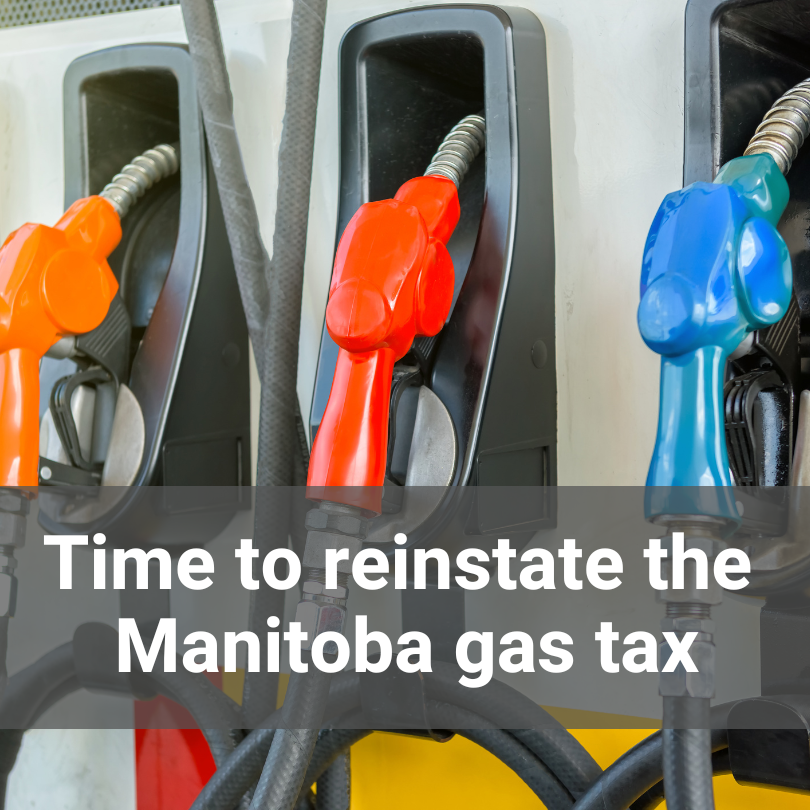Previously published in the Winnipeg Free Press August 28, 2024

Since the oil price shocks of 2021/22, gas taxes have become highly political in Canada. Premier Smith in Alberta, and Premier Ford slashed gas taxes in 2021/22. In January 2024, Premier Kinew followed suit by implementing Manitoba’s gas tax holiday.
Since January, Manitoba’s inflation rate has remained within the Bank of Canada’s target rate (1-3%) or lower. Affordability has been achieved for drivers, but now it is time to turn the page and deliver affordability for Manitobans who are struggling with the high cost of goods such as housing or childcare. Manitoba has the policy tools to achieve while keeping the need to repair public services and help Manitobans transition to clean energy in sight.
Provincial and federal gas taxes were implemented across Canada alongside the rise of mass car ownership. Gas taxes are based on a user-pay principle – the more cars and trucks use the roads, the more they pay gas taxes to cover needed repairs and upkeep. The only problem with this model is that gas taxes in Canada have never brought in sufficient revenue to pay for road wear and tear.
The gas tax in Canada and Manitoba is quite low. Compared to other countries, Canada’s average combined federal/provincial gas tax in 2022 (41c/litre) was less than half the OECD average (88c/litre). Only two countries, Turkey and the United States, levy gas taxes lower than Canada. Most OECD countries have taxes on vehicles tied more closely to maintenance required for public roads.
Part of the reason gas taxes are so low across Canada is because they are not indexed to increase alongside infrastructure costs. Manitoba’s gasoline tax was last increased in 2012, from 11.5c/litre to 14c/litre. Prior to 2012 the last gas tax increase was from 10.5c/litre to 11.5c/litre in 1993.
Those who do not own a vehicle and are more likely to be on fixed and/or low-incomes do not benefit from gas tax cuts. The cost of transit in Winnipeg went up 10 cents in 2024, and cities like Winnipeg show no signs of passing on any fuel savings to passengers due to the dire state of transit funding in Manitoba.
Food prices have not come down either. Despite Premier Wab Kinew’s suggestion that local grocery stores pass on transportation cost savings to consumers through lower prices, food costs have plateaued across the country, indicating that there has been no downward pressure on food prices here in Manitoba due to the gas tax cut.
There is no question that Manitobans need a break on their bills. This is particularly true for Manitobans who are on fixed incomes and those who do not have the disposable income to absorb price increases. The province has other tools to provide affordability relief while achieving complementary goals of expanding much-needed public services, repairing the care sector, and providing green energy.
One key area under the control of the province is childcare. Currently, low-income parents below the poverty line pay $40 a month for childcare – if they can find a space due to Manitoba’s childcare deserts. Quality, public childcare is a popular policy tool as it helps families with affordability, plus it is an economic development tool and more than pays for itself. Building up Maniotoba’s care economy is a key component of developing a low carbon economy.
Accelerating the transition to renewables will also make Manitoba more affordable; renewables are not subject to oil and gas price volatility. The costs of doing nothing to mitigate climate change are far higher than the costs of taking action over the long term. Destructive weather events turbocharged by climate change, such as fires, flood, and drought, are already impacting Manitoba. Across the US, losses for home insurance companies created by extreme weather are causing those companies to raise premiums by as much as 50%, reduce coverage, or leave entire states – even midwest states once thought to be insulated from climate risk.
Rising oil prices accounted for 33% of the CPI increase from Feb 2021 to June 2022, before tallying effects further along supply chains. Oil prices rise and fall based on the dynamics of supply and demand in a global oil market, a dynamic that has become increasingly volatile over the last twenty years. Renewable energy prices, by contrast, have been slowly dropping over the last two decades.
It is time for Manitoba to upgrade its affordability strategy to align with other policy goals like expanding child care access, housing affordability, and building a low carbon economy.
Niall Harney is the Errol Black Chair in Labour Issues, and Molly McCracken is the Manitoba Director. Both are with the Canadian Centre for Policy Alternatives – Manitoba.


